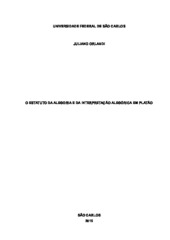| dc.contributor.author | Orlandi, Juliano | |
| dc.date.accessioned | 2016-09-15T13:55:17Z | |
| dc.date.available | 2016-09-15T13:55:17Z | |
| dc.date.issued | 2015-04-14 | |
| dc.identifier.citation | ORLANDI, Juliano. O estatuto da alegoria e da interpretação alegórica em Platão. 2015. Tese (Doutorado em Filosofia) – Universidade Federal de São Carlos, São Carlos, 2015. Disponível em: https://repositorio.ufscar.br/handle/ufscar/7181. | * |
| dc.identifier.uri | https://repositorio.ufscar.br/handle/ufscar/7181 | |
| dc.description.abstract | The theme of this thesis is the use of allegories and allegorical interpretation in the works of Plato. It arises from the verification of a paradox between the occurrences of this rhetorical or literary device and the negative comments that the philosopher addresses sometimes to them. In certain passages of his dialogues, such as the beginning of the Book VII of The Republic (514a to 517a), Plato presents metaphorical narratives which add themselves, without any restriction on his part, with the argumentative development of his ideas. In other parts, however, as at the prologue to the Phaedrus (229c-230a), he expresses unfavorable opinions about the allegories and allegorical interpretation. In this sense, the philosopher seems to reject a discursive device that, paradoxically, he usually employs. My goal is therefore examine comparatively the allegorical passages of the corpus platonicum to reveal
its constituent structure and the possible variations to which they are submitted. What I hope, in fact, is to find the theoretical notions that allow dissolve the paradox and restore the internal coherence of platonic thought on the issue of allegories. | eng |
| dc.description.sponsorship | Coordenação de Aperfeiçoamento de Pessoal de Nível Superior (CAPES) | por |
| dc.language.iso | por | por |
| dc.publisher | Universidade Federal de São Carlos | por |
| dc.rights.uri | Acesso aberto | por |
| dc.subject | Platão | por |
| dc.subject | Alegoria | por |
| dc.subject | Mito | por |
| dc.subject | Plato | por |
| dc.subject | Allegory | eng |
| dc.subject | Myth | eng |
| dc.title | O estatuto da alegoria e da interpretação alegórica em Platão | por |
| dc.type | Tese | por |
| dc.contributor.advisor1 | Souza, Eliane Christina de | |
| dc.contributor.advisor1Lattes | http://lattes.cnpq.br/5658382257368048 | por |
| dc.description.resumo | O tema desta tese é o uso das alegorias e da interpretação alegórica nas obras de Platão. Ele surge da constatação de um paradoxo que se estabelece entre as ocorrências desse expediente retórico ou literário e os comentários negativos que o
filósofo, por vezes, lhes dirige. Em certas passagens de seus diálogos, tal como no início do Livro VII d'A República (514a-517a), Platão apresenta narrativas de caráter metafórico que se ajuntam, sem qualquer restrição de sua parte, ao desdobramento argumentativo de suas ideias. Em outros trechos, no entanto, tal como no prólogo do Fedro (229c-230a), ele manifesta opiniões desfavoráveis a respeito das alegorias e da interpretação alegórica. Nesse sentido, o filósofo parece rejeitar um expediente discursivo que, paradoxalmente, ele mesmo costuma empregar. Meu objetivo é, por conseguinte, examinar comparativamente as passagens alegóricas do corpus platonicum para revelar sua estrutura constitutiva, bem como as possíveis variações às quais estão submetidos seus elementos. O que espero, na verdade, é encontrar as noções teóricas que permitam dissolver o paradoxo e restituir a coerência interna do pensamento platônico no tocante à questão das alegorias. | por |
| dc.publisher.initials | UFSCar | por |
| dc.publisher.program | Programa de Pós-Graduação em Filosofia - PPGFil | por |
| dc.subject.cnpq | CIENCIAS HUMANAS::FILOSOFIA | por |
| dc.ufscar.embargo | Online | por |
| dc.publisher.address | Câmpus São Carlos | por |
| dc.contributor.authorlattes | http://lattes.cnpq.br/7810540177032001 | por |
